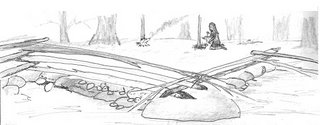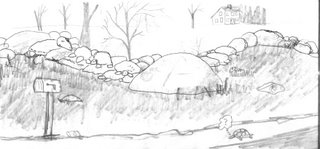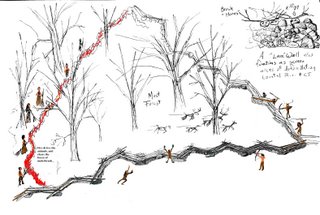
From "Turtle Island"
by Gary Snyder
(1969)
CONTROL BURN
What the Indians
here
used to do, was,
to burn out the brush every year.
in the woods, up the gorges
keeping the oak and pine stands
tall and clear
and kitkitdizzie under them,
never enough fuel there
that a fire could crown
Now, manzanita,
(a fine bush in its right)
crowds up under the new trees
mixed up with the logging slash
and a fire can wipe out all.
Fire is the old story.
I would like,
with a sense of helpful order,
with respect for laws
of nature
to help my land
with a burn, a hot clean
burn
(manzanita seeds will only open
after a fire passes over
or once passed through a bear)
And then it would bemore
like,
when it belonged to the Indians
Before.
You may have seen these before, a few original drawings. How difficult it is to capture the whole network of stone rows that remain, untended for 300 years now, right around where I live - and where you may live too, for that matter - without walking "off the path" in some places, right along it in others...



http://forestry.about.com/od/prescribedfire/ss/pres_fire.htm
http://www.ser.org/iprn/tek.asp
http://publications.theforesttrust.org/download/pdf/DT12.pdf#search=%22controlled%20burn%20%2B%20%22dennis%20martinez%22%22

That SER link is great. For so long, "forest management" has meant removing any trees that were old enough (and thus worth enough money) or dead enough to provide habitat for any but the most common organisms. When I spoke with descendants of native people in my area, they explained that the image of the savages scraping out a living from the hostile wilderness was a Western myth--that their forefathers worked with the land and life around them in ways different from modern husbandry but with similar effect, the reason why the land seemed so rich and fruitful (lush forests full of nut-bearing trees, abundant game, streams full of fish . . .) to the Europeans when they arrived. They were able to travel very widely because they could easily live off the land wherever they went.
ReplyDeleteI become more convinced as time goes on that shamanic societies were based not on superstition but on esoteric technologies that our society is only beginning to fathom. And of course the idea that an individual can be allowed to profit at the expense of the survival of the group wasn't part of that ethos.
Hey, stop making me think!
Hey!
ReplyDeleteThinking is a good thing to do - almost as good as daydreaming...